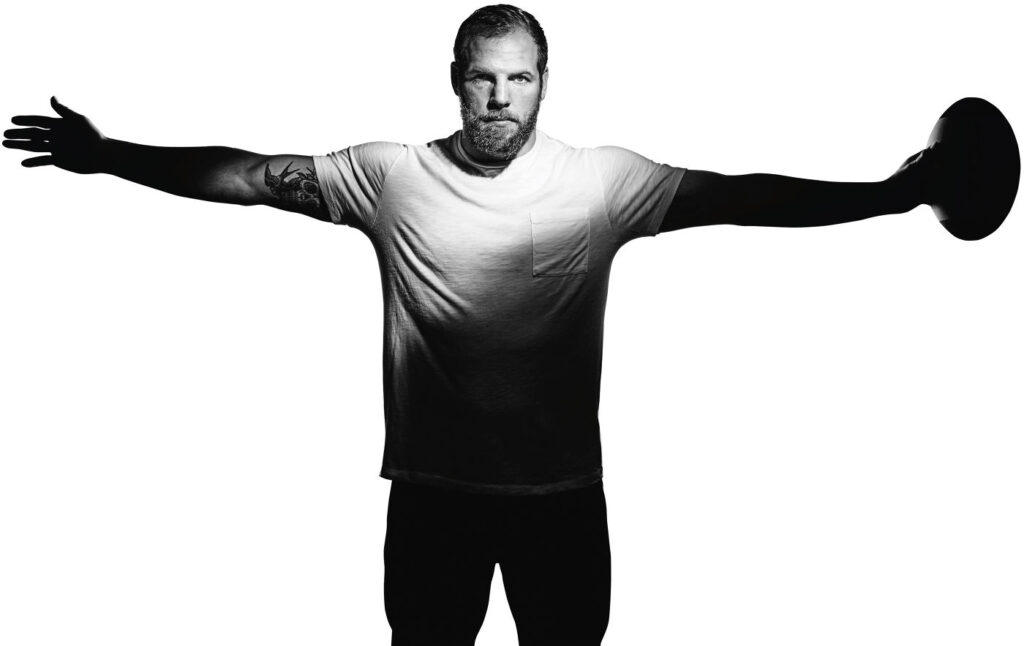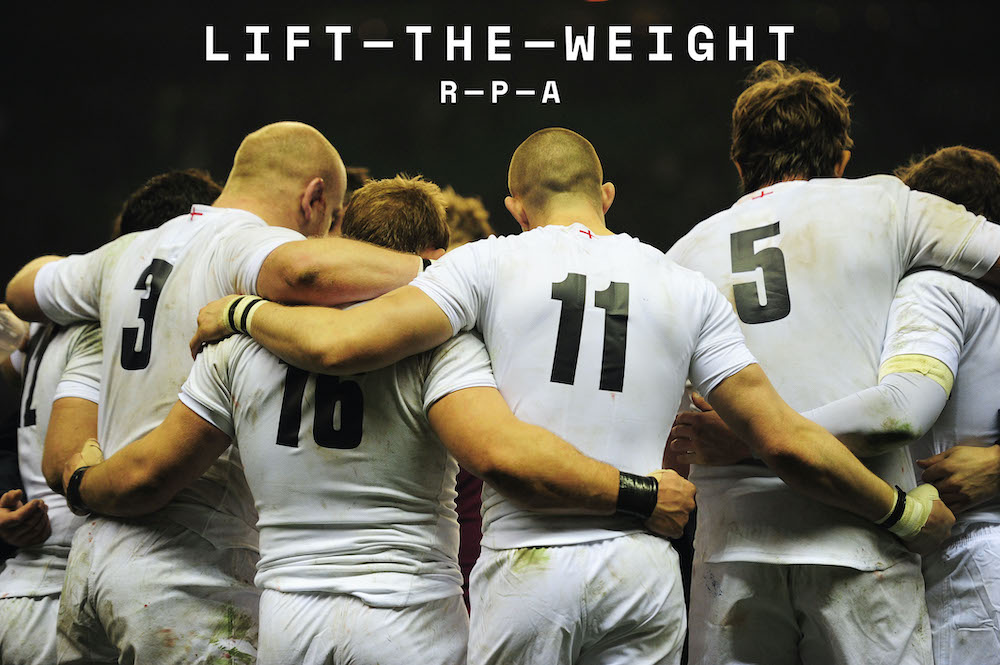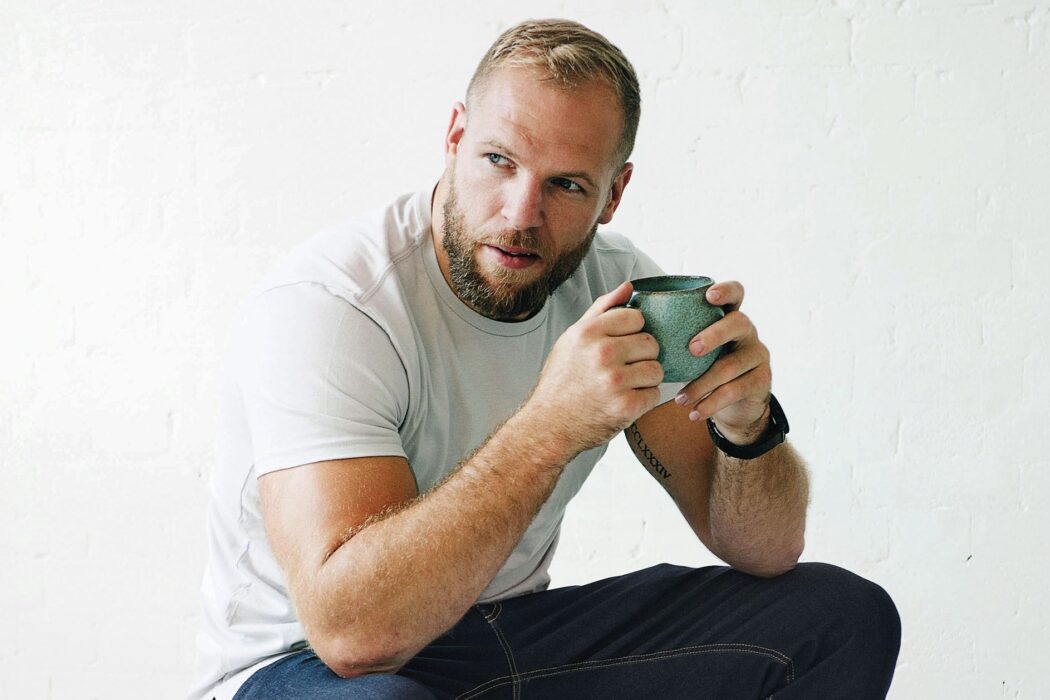The Rugby Players Association launched the ‘Lift The Weight’ campaign in 2017. A Professional Players’ Federation (PPF) survey of retired players revealed 62 per cent experienced some sort of mental health issue. The RPA offers transition support, financial management advice, as well as a personal development programme for players, and its services are available for those who have retired. We sat down with James Haskell and Damien Hopley, RPA Group Chief Executive, to find out why it is so important to #lifttheweight.
Damian, can you tell us why the RPA launched Lift the Weight three years ago, and more importantly, how it’s helped?
The Why.
At the time we launched Lift The Weight, we were aware that one in four people in the UK would experience mental health challenges. We were also seeing a significant demand placed on development managers supporting roughly 20% of players nationwide each month, who were seeking support with wellbeing related issues.
Players listen to players. Sport is an alpha environment where mental fragility can, wrongly, be seen as a weakness. We wanted to raise awareness, reduce the stigma and signpost to support available.
The 2017 Lift the Weight campaign, resulted in 700,000 online video views, more than 150 articles and features, reaching more than 33 million people. Alsom, a 67% increase in referrals to the RPA Confidential Counselling Service, funded entirely through our official charity, Restart.

The How.
You need only look at the prevalence of players speaking openly about their mental health, recognising the challenges faced by their peers and, crucially, willingness to help them see how far the awareness has been raised. The increasing player demand on the RPA confidential counselling service is also testament to players being more aware and taking positive action.
It has also helped engage clubs and the wider game on the need to do more in this area. Mental health is now better understood and it can impact individuals in different ways at different times. LTW has not only raised awareness, it has provided a platform to identify specific requirements and target support more effectively across the player group – for example, Academy, Transition, Alumni, Injury etc. We also work hard to deliver preventative education, such as resilience training, transition preparation, addictive behaviours, to name a few.
Mental health is no longer a topic to tell players about focusing on mental illness only. It’s as much about positive wellbeing and recognising when you and your teammates need to get support with mental health. A really good example of this is the peer to peer ‘team talk’ cards which promote healthy discussions between players. Players are now part of raising awareness, reducing the stigma and signposting to support. The Mental Health First Aid courses delivered at clubs for players and due to be rolled out nationwide is a great example of this. Players are now training to upskill themselves in how to provide mental health support to others.
James, what does the Lift The Weight campaign mean to you?
The Lift the Weight campaign is something I think is really important – especially in a male dominated environment like rugby, because men are pretty terrible at voicing their issues around mental health and being honest around that. It’s really important that players of all shapes and sizes are able to speak up. I’ve never been directly affected with mental health issues myself. I’ve always spoken to sports psychologists to help with performance and I’ve always been very open about voicing my current mood and my mindset and how I’m feeling. I think a lot of people say everything is fine when it’s not. The last time I took part in the Lift The Weight campaign, I was one of the only people there who hadn’t had major issues in comparison to someone like Wilkinson or Ollie Phillips. But I thought it was important as I’m often seen as – and I use this word tentatively – an alpha male, who normally might not be open about my experiences. I was very clear that it’s important to speak up.
What advice would you give someone struggling?
The advice I would give to someone who needs help with their mental health is pretty simple. Don’t be scared to reach out and understand that everybody is going through something, even the most successful people, even the happiest people, even the people who post all the best photos on social media. Everybody has something – and you should never be ashamed of it. If you don’t want to reach out to a professional, then pick up a phone to a friend and share it, because talking is really helpful. Also, with Restart, there’s an anonymous helpline you can call. Just voicing your problems and concerns can make a massive difference.

(Photo by Shaun Botterill)
Damian, do you think we’re turning a corner to give people the mindset to speak out about how they feel to others?
I believe there is much greater awareness about the topic in rugby than previously, thanks to the Lift The Weight campaign, and in the media and society in general than a few years ago. We have players who openly discuss their own mental health in the media to help others, and this creates discussion and a deeper peer-to-peer support network. There is always more that can be done to give people the support to speak how they feel. A quarter of all people will experience a mental health condition at some point in their life. It’s important to understand that athletes and rugby players are human, and they make up this statistic. This motivates us to make the subject even more prevalent.
Arguably, mental health issues can affect us all. But the pressure and strain on professional athletes is intense. From injury to the pressure to perform alongside media scrutiny. Can you talk about the support systems the campaign uses to keep players healthy Damian?
The RPA Development Managers have trusted one-to-one relationships with players that are consistently supported from pro-player induction all the way through to transition and beyond. We prioritise knowing our players and being there for them. On average, each month, 18% of players nationwide have sought wellbeing advice from their RPA development manager. All development managers are mental health first aid trained and also provide early detection and crisis management as part of a robust higher welfare protocol. Over 350 players have referred to the RPA Confidential Counselling Service since 2008 – funded solely by RPA Charity, Restart.
We promote player-led storytelling, use innovative and constantly evolving engagement approaches with players – team talk cards, resilience training, MHFA training, as well as preventative education: gambling awareness, addiction, alcohol awareness, mental health team talks, resilience training, Playing It Safe (sexual consent), cultural diversity, social media.
The RPA also does extensive research, including psychological load research, past player wellbeing and transition research, as well as a member welfare survey. Global best practice is also essential – for example,. vital world players, IRP and PPF collaboration and learning networks inform good practice.
Why do you think there is such an incredible stigma surrounding people speaking out about their hopes, dreams and fears in modern society?
Vulnerability (role models), understanding (support access) and responsibility (clear pathways).
Sharing anything personal requires a trusted place to speak about it. It takes real strength to be vulnerable with someone, but the places and people available to create these spaces are finite resources.
If a person feels able to discuss their vulnerabilities and the space is created to share, how that space is managed by the person listening is crucial to what happens next. Understanding how to listen, be empathetic and provide helpful support comes naturally to some. But often that space is managed by trial and error, so empathy can be dominated by a lack of understanding and fear of not knowing what to do or not wanting to take the time to understand.
Sharing a vulnerability and being there to support is uncomfortable and exhausting. The weight of responsibility is significant for all involved. It’s easier to avoid the responsibility to act if one is not sure how to manage the steps that follow.

Presumably financial management and support must be a key point of the program James?
Every player has a dream of playing rugby forever – to be super successful and not have to find a second career. But the realisation that life will change soon dawns on you, and you need to prepare for that from the very first moment you step on the field. You need to be preparing for what you are going to do outside of rugby. Getting that focus right is a very fine balancing act. If you live and breathe rugby, then when it’s going well, that’s brilliant. But when rugby isn’t going well, then all you’ve got is that and you’re unhappy. So, having an opportunity to further your studies, to get work experience, to develop a business yourself – it brings a really important point of difference. Ask financial advisers and services, look at saving plans, taking a section of your salary and, however little, putting it away for later down the line. You need to build a foundation.
Can you speak a little regarding how Restart supports players Damian?
Restart has invested over £1.7million into player support since 2005, having supported over 300 players.
Restart funds financial, practical and emotional support by providing help with the cost of long-term or ongoing medical treatment; 24/7 Confidential counselling to help players and their families cope during difficult times; assistance to pay for equipment or home improvements to help with rehabilitation or disabled access; financial support if a player is unable to work as a result of illness or injury.
Restart has supported players who have suffered life changing injuries, such as Andy Blyth, Matt Hampson, Ed Jackson and more recently Michael Fatialofa. Restart also supports players and their families when illness strikes, such as Tom Smith and Paul van Zandvleit – the latter passed away in 2017 having lost his battle with cancer.
Nearly 2 out of 3 players struggle with mental health issues post-retirement. On average, 50 current and former players every season are referred to the Confidential Counselling Service to receive support by a trained professional providing help around issues such as anxiety, depression and stress, coping with injury, relationship issues, career transition, addiction and bereavement. Restart fully funds the Confidential Counselling Service which costs up to £60k every season
So you must see the support network actually in effect with team mates and alike James?
For me, Restart is the silent hero that really helps players in the professional game. It not only restarts their lives after injury, but also gives them a blanket of security in terms of mental health and other issues they may be facing. Restart and the confidential counselling service has essentially saved lives and it’s funded solely through fundraising events. Nothing from clubs or the RFU goes towards it, and it’s there for players. You may not think you will ever need it and you take it for granted, wear the t-shirt, tweet about things, but never really look into it until you desperately need it – and so many players desperately do. There’s 50 or 60 players who are consistently using that helpline every season to aid their mental health and stop themselves from doing something stupid. It’s a lifesaving organisation and it is something that we all need to focus more on.
The ONS reported this month that depression has doubled in the UK during lockdown and isolation. How has Lift the Weight reacted to the step change in operations?
All the RPA development managers spoke to every player they have in their club cohorts on multiple occasions during lockdown. They set up virtual coffee mornings, sent out and followed up different lifestyle advice, anything from ideas on teaching children at home, to how to develop sleep patterns and routine. We had a regular series of interactive webinars on a variety of topics, from different career insights to wellbeing concerns. We understood that access to our confidential counselling service might be difficult during lockdown, so provided a pathway for players to text or email their worries or concerns over to qualified medical practitioners. Players were updated weekly with a variety of education options and courses and we saw a rise in our members engaged in education during this time.
The Professional Players Federation reported that most of the Player Associations haven’t experienced a huge increase in use of their helplines during lockdown, but it’s expected to rise over the coming months as players might recognise they need support. Reasons might be Players might have used the resources that had been sent to them, it was difficult to talk during lockdown and an understanding of ‘not expecting to feel normal’.
How do you think change could be influenced within the existing UK healthcare system to better cater for those suffering from mental health issues?
Change could be influenced within the existing UK health care system by strength of leadership to prioritise funding; role models across society; champions networks; clear opportunities and access to specialist support – not just mental ill health, but proactively supporting people to help themselves achieve positive wellbeing, such as mental fitness; and education – targeted and current.
What’s the plan for the organisation moving forward into 2021? More centers, more support, a larger network?
Secure funding for the game to continue to use the existing infrastructure support. Continue to develop the team of DMs as our first line to support. Develop opportunities for more peer-to-peer support. And club engagement and collaboration.
How did you go about approaching the players involved? Did any of their stories surprise you?
The players and the development managers in the clubs have a great relationship. Understanding them as people, not solely as rugby players, is the key for the trust and connectivity in those relationships. During lockdown, these relationships with that pastoral, holistic and independent support that the RPA gives, and then our members wanting to help others were key.
The range of stories we were able to tell under the Lift the Weight banner was incredible. Each story illustrated the strength of that player to share their darker moments to help other players who may feel the same. We are so grateful to all the players who bravely shared their stories.
Key takeaways are transparency – we knew the players well already, explained why we were doing it and how. Players never fail to surprise you. Their depth of courage, strength of character and overwhelming willingness to help others is a privilege to witness.
If our readers want to reach out to offer support, what’s the best way?
Restart receives no government or lottery funding, so the charity relies entirely on voluntary donations and fundraising efforts. Any donation, big or small, will make a difference to the players we are here to support. To donate, take on a fundraising challenge or organise your own fundraising event, please visit restartrugby.org for more information.
We all know that life after the game goes on, with many players finding second careers. 50% of players have said they’ve had financial difficulty in the last five years. How do we even begin to address that?
Preventative education. Informed decision making and consistent access to support. Life after rugby preparation starts for professional players as soon as they sign their first contract in the academy at 18. Players need to be proactive and have realistic expectations of what life after rugby looks like and we can help them understand this from day one of their professional career.
Alongside a game-wide mandate for players to be supported in pursuing a dual career approach while playing – investing in themselves for the future – they also have access to targeted life skills learning opportunities to make responsible choices about money. Financial awareness education is an essential part of the support we provide to all players.
But we are not financial experts, so we work with financial experts such as Sanlam and Barclays, so players can have access to independent and qualified advisers to help them make informed decisions about their money.
What advice would you give someone suffering in silence, concerned to voice their distress?
You are not on your own and you always have options. Please find someone you trust to share what you are thinking. It doesn’t need to be someone you know. There are some wonderful organisations who know how to listen and are in place to provide you with a trusted place to share what you are thinking.
If you are an RPA member, you can access 24/7 confidential counselling by contacting️ Cognacity on 01373 858 080 if you are not a member go to: therpa.co.uk/lift-the-weight



LIFT THE WEIGHT — James Haskell on why it’s important to talk about mental healthThe Review Magazine. Life. Style. | The Press
[…] This content was originally published here. […]